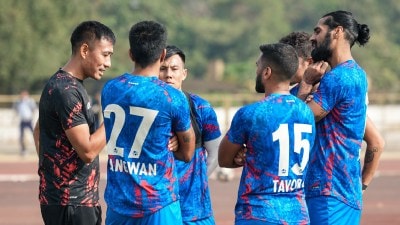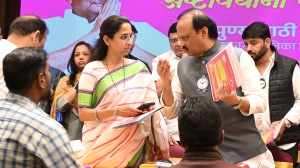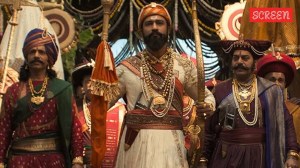ORIENT EXPRESS
Jwala Gutta has squared off against many players from China on the badminton court. She tells us about her Chinese connection
Jwala Gutta has squared off against many players from China on the badminton court. As she celebrates the mixed doubles Grand Prix gold she won last week,she tells us about her Chinese connection
Its more than skin deep. But what Jwala Gutta likes most about her Chinese legacy is the flawless skin she owes her mum. That and the authentic Chinese noodles that her mother cooks for her. Thats it. The food and the good skin. What more do you need? she says. Last Sunday,though,when the badminton player won Indias first mixed doubles Grand Prix gold title at Chinese Taipei with partner V Diju,she must have also said a thank you to her Chinese genes.
Gutta,who is ranked seventh with Diju among world mixed doubles pairs and who picked two GP titles at the Bitburger and Bulgarian Open last year,was nudged into badminton by her Chinese-born mother Yelan. After much prodding,the player,who turns 26 tomorrow,gives away the fact that the two cultures she was born intoIndian and Chinesemoulded her into becoming one of Indias finest badminton players. Her father Kranti Gutta comes from a Telugu family of freedom fighters and progressive Leftists,while Yelan was the fiery,straight-talking grand-daughter of a Gandhian from China. She was the eldest in her family and took care of her two younger brothers in her early years in India,then a foreign land. I was very bindaas. Jwalas a reflection of me,thats why she reacts so sharply and honestly to everything, says Yelan.
Indeed,Guttas aggressive not just on court,but has been outspoken off it too. Two years back,she took on badminton officialdom after differences of opinion with the coach who insisted on a particular regimen for training and long camps,while she believed playing tournaments suited her better. After the row was resolved,she pushed hard to return to the circuit and go up to No 7 in the world. She speaks her mind and will cross every obstacle you put in front of her because she doesnt like unfairness, says Yelan.
Guttas great-grandfather Tseng,a Chinese editor of a Singaporean newspaper,visited the Sabarmati ashram in the mid-1930s and even interacted with Mahatma Gandhi. He was called Shantidoot by the Mahatma,who urged him to adopt Gandhian principles of non-violence during the Civil War that was raging in China between the two World Wars.
Shanti also means holy in Chinese, says Yelan. When he wanted to return to India in the 1960s,the Sino-Indian war broke out and he couldnt. In the 1980s,the Gandhi Peace Foundation invited him,and thats how we came here, she says.
Yelan met Kranti,who was studying to be a doctor at a medical college at Sevagram in Wardha,Maharashtra,as a teenager and they were married when she was 19. Jwala was born a year later in Wardha and had visited Sevagrams famous ashram as a child. She remembers every nook as vividly as she recalls the searing pain she felt when she suffered a cut just above her eye after falling off a bed as a three-year-old.
When the family moved to Hyderabad,four-year-old Gutta began her journey into the world of sports. We started her on tennis but made sure she did swimming and gymnastics as a kid since thats the foundation of every Chinese athlete and also what her first coach,SM Arif suggested, says Kranti.
Yelan,who was a badminton and basketball player in her younger days,didnt quite fancy tennis. Since shed grown up watching the nuanced grace on shuttle courts in China,she put Gutta into badminton early on. They start gymnastics in China in Class 1,and they dont spend a single paisa on sport as the government takes care of everything. Passing exams isnt everything. Sport and moral science are equally important, she says of the champion nation which has at least a lakh people playing the sport.
When Gutta was growing up,Yelan had to battle the typical Indian apathy towards sports. A coach once suggested Gutta fudge her age to compete in a younger age-category. Yelan put her foot down and told me to not teach her wrong methods, Kranti says.
Guttas studies didnt come in the way of her game. Her parents didnt ask her to stop training during her Class 10 board examinations and she practiced through the exams,hoarding up junior titles. The hurdles in India start with professional colleges,where studies become more important,then the job,which impedes progress and motivation. Not in China. Lin Dan the current mens badminton world champion is hardly qualified,but hes on top of the game. Jwala never let those come in the way either, says Kranti. He adds his daughter has even defeated the third hurdle he calls marriage Gutta is married to player Chetan Anand and is confident shell keep playing well even after the fourth hurdle,children.
The talk of children gets Guttas Chinese-speaking grandmother Li Ya Jun,visiting India from TianJian,excited. She got rather attached to this grand-kid after a visit to India when Jwala was only a few months old and now she chirps that shed love to see Gutta settled with children. Mother Yelan waves off the suggestion. I devoted my prime years from 25 onwards to ensure Jwala did well in sport. Let her first achieve her Olympics goal, she says.
Tears streaked down Li Ya Juns cheeks as she watched the crowds in Hyderabad cheer Gutta on during last months World Championships. Its nice to see how famous she is. But shes remained the kind person she always was,helping everyone around,taking care of her people, she says,as she shows off the red salwar-kameez Gutta brought for her. There are small things like how kindly she treats drivers and helpers. In China,we are not conscious about class. Its nice to see the humaneness in her, she says.
A recent sponsorship deal between Gutta and husband Anand,and Chinese sporting major Li Ning named after the countrys greatest gymnast had Gutta reconnecting with her Chinese roots five years after she trained at Shenyang in 2002. Thats also when she last visited her grandparents. As kids,we could never afford going to China,but my grandparents visited Delhi often and brought me chocolates and silks, she says.
It also helped that mother Yelan knew more than a little about the fluttering path of the shuttle.
- 01
- 02
- 03
- 04
- 05































